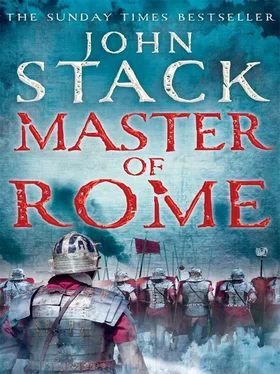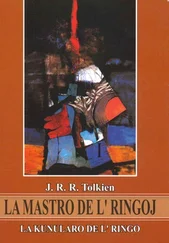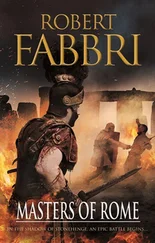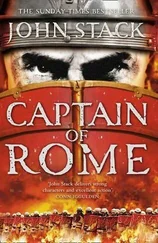John Stack - Master of Rome
Здесь есть возможность читать онлайн «John Stack - Master of Rome» — ознакомительный отрывок электронной книги совершенно бесплатно, а после прочтения отрывка купить полную версию. В некоторых случаях можно слушать аудио, скачать через торрент в формате fb2 и присутствует краткое содержание. Жанр: Исторические приключения, на английском языке. Описание произведения, (предисловие) а так же отзывы посетителей доступны на портале библиотеки ЛибКат.
- Название:Master of Rome
- Автор:
- Жанр:
- Год:неизвестен
- ISBN:нет данных
- Рейтинг книги:4 / 5. Голосов: 1
-
Избранное:Добавить в избранное
- Отзывы:
-
Ваша оценка:
- 80
- 1
- 2
- 3
- 4
- 5
Master of Rome: краткое содержание, описание и аннотация
Предлагаем к чтению аннотацию, описание, краткое содержание или предисловие (зависит от того, что написал сам автор книги «Master of Rome»). Если вы не нашли необходимую информацию о книге — напишите в комментариях, мы постараемся отыскать её.
Master of Rome — читать онлайн ознакомительный отрывок
Ниже представлен текст книги, разбитый по страницам. Система сохранения места последней прочитанной страницы, позволяет с удобством читать онлайн бесплатно книгу «Master of Rome», без необходимости каждый раз заново искать на чём Вы остановились. Поставьте закладку, и сможете в любой момент перейти на страницу, на которой закончили чтение.
Интервал:
Закладка:
He suddenly thought of Lucius, his former second-in-command, and how the older man would have been on the foredeck with him, shadowing his every move. He had yet to achieve that same bond with Baro; he was a harsher man than Lucius, but effective in his own right, and Atticus knew he could trust the experienced seaman.
‘Over three hundred galleys,’ Corin called out in excitement. ‘Heading west on a direct course to Aspis.’
Atticus heard the report and checked the line of his squadron, the other galleys getting under way. He nodded to Gaius as he reached the aft-deck, but the helmsman did not return the gesture, his attention as always locked on the task at hand, his hand playing lightly over the tiller as he made minute course adjustments to the one hundred and ten-ton galley. The weeks of inactivity while the squadron waited in Aspis had driven Gaius to near madness, the fact that the hull lay stationary beneath his feet was contrary to his every instinct. Now, although his face was expressionless, Atticus knew that Gaius was charged with anticipation.
‘Your assessment,’ Atticus said, and the helmsman looked to him for the first time.
‘It looks as if the Carthaginians are running,’ Gaius said after a moment’s pause, his expression puzzled.
‘But,’ Atticus prompted, noticing the helmsman’s hesitation. He too had noticed an anomaly in the Carthaginians’ manoeuvre, but he wanted to draw out the helmsman’s thoughts, knowing that Gaius’s intimate knowledge of the capabilities of a galley, and his skill at attaining the best possible position in battle, made his opinion invaluable.
‘They’re staying in formation,’ Gaius replied, after a moment. ‘If they really wanted to flee then they would have broken formation and scattered, making our pursuit more difficult.’
Atticus nodded, looking to the rear of the Carthaginian formation a thousand yards ahead as the last of the galleys disappeared around the northern headland protecting the port of Aspis. By the time the Orcus reached that point, Atticus knew the distance to the enemy rear would be even greater, his pursuit from dead-stop giving the Carthaginians the initial advantage.
‘Maybe they’re planning to fight,’ Atticus said, doubting his own words even as he spoke them.
‘They’re too outnumbered,’ Gaius remarked, glancing to the approaching Roman fleet.
Atticus nodded again and set his mind to the task. He moved to the side rail to get a better view of the sea ahead. ‘Gaius, what’s north of here?’ he asked.
‘The coastline runs north for ten leagues to a cape and then turns southwest for forty leagues into the bay of Carthage.’
They’ll never get as far as Carthage, Atticus thought, but, as he looked to the approaching Roman fleet, waiting for them to change course to intercept the Carthaginian formation, a sliver of doubt remained in his mind. Barca had been beaten before, but never due to error, and Carthaginian seamanship still outmatched that of most Roman crews. If the enemy were staying in formation, then their true motive was yet to be revealed.
‘They’re running,’ Nobilior shouted in elation.
Paullus turned to the junior consul and frowned, regarding the excessive display of emotion as undignified, although he too felt the satisfaction of seeing the enemy flee in the face of his command.
‘Helmsman, change course to intercept,’ Paullus ordered, and the Concordia turned two points to starboard, the fleet behind responding immediately.
The enemy fleet was still some five miles away, sailing parallel to the coastline, their galleys bunched together as if racing each other in a bid to escape. Paullus followed the line of their course, immediately seeing the land give way to the north as it turned a headland.
‘Helmsman,’ he said, ‘increase speed. I want to reach that headland before the enemy has a chance of rounding it.’
The helmsman nodded, calling for battle speed, and Paullus nodded in satisfaction as he felt the pace of the Concordia increase. He looked to the main deck and the ordered ranks of the legionaries, sensing their expectation, allowing it to feed his own impatience, and he sneered in contempt as he thought of the enemy’s futile attempt to escape his wrath.
‘The Romans are turning to pursue,’ the lookout called, and Hamilcar glanced over his starboard aft-quarter to confirm the course change of the enemy fleet before turning to look out over the aft-rail. The Roman galleys from Aspis were just breaching the harbour mouth, now more than two miles behind the last ship in his formation, and Hamilcar watched as they neatly formed behind the lead galley, beginning their pursuit in earnest.
Hamilcar turned to the sea ahead and the coastline to his left, silently naming the landmarks in sequence as the Alissar sped north, his intimate knowledge of the shoreline deepening his resolve to deny the Romans any part of his people’s sacred land. To his right the Roman fleet was slowly closing the gap as they sailed diagonally towards him, revealing their simple plan to cut his course as he made to round Cape Hermaeum. Hamilcar thanked Tanit for the Romans’ actions, forgetting her earlier duplicity.
His fleet was outnumbered, but Hamilcar knew he stood a reasonable chance of thwarting the Romans’ attempt to trap him if he could level the odds or — better yet — turn them in his favour. Victory might yet be possible or, failing that, retreat with honour. Either way, Hamilcar needed to keep his fleet together, and Cape Hermaeum would give him that chance.
Atticus stayed at the side rail of the aft-deck as the Orcus settled on a northerly track, the galleys of his command slipping into the wake of the Carthaginian formation, using the enemy’s course to avoid any hidden shallows along the coastline. He was joined there by Septimus, while the legionaries formed up behind Drusus on the main deck, the proximity of the enemy dictating every action on the quinquereme.
‘The main fleet will reach the enemy first,’ Atticus said, thinking aloud, judging the angles and speed of their attack.
‘Pity,’ Septimus replied, his hand kneading the hilt of his sword, the anger he felt at the loss of the Ninth increasing with every oar stroke, the fact that Hamilcar Barca was in command of the enemy fleet giving his aggression a keen edge.
Atticus looked to his friend and nodded, understanding his fury, his own battle lust rising within him. The Ninth was Septimus’s former legion, but Atticus had formed his own bond with the legionaries over the previous years, understanding and accepting the symbiotic relationship between the two forces. He had put his ship and his crew in harm’s way many times to protect the soldiers of Rome.
The Orcus sped on, her ram slicing cleanly through the calm water, the gentle swell separating cleanly across her cutwater to run down the length of her hull, her wake instantly sliced by the ships behind. The galley’s crew settled into silence, the drum beat dominating; the trailing wind tugged at the furled sail, the creak of running rigging and the rhythmic splash of the oars replaced the shouted commands. The pursuit demanded nothing more of the crew than patience as each man waited for the battle to come.
Atticus rubbed his fingers on the side rail, his eyes constantly darting to the four points of his galley, checking and rechecking her trim, the unconscious routine of a man who had spent his life at sea. Septimus stood immobile beside him, his hand resting on the hilt of his sword, his eyes focused two miles ahead on the enemy galleys, watching with the endless patience of a career soldier.
‘You’ll target Barca’s galley?’ Septimus asked, glancing at Atticus, whose gaze was locked on the two convergent fleets.
‘Don’t worry, Septimus,’ he replied, never taking his eyes off the waters ahead. ‘We’ll get him.’
Читать дальшеИнтервал:
Закладка:
Похожие книги на «Master of Rome»
Представляем Вашему вниманию похожие книги на «Master of Rome» списком для выбора. Мы отобрали схожую по названию и смыслу литературу в надежде предоставить читателям больше вариантов отыскать новые, интересные, ещё непрочитанные произведения.
Обсуждение, отзывы о книге «Master of Rome» и просто собственные мнения читателей. Оставьте ваши комментарии, напишите, что Вы думаете о произведении, его смысле или главных героях. Укажите что конкретно понравилось, а что нет, и почему Вы так считаете.










